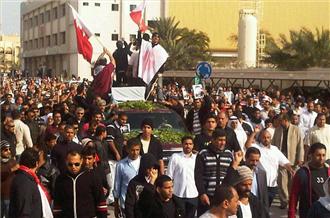Thousands have camped out overnight and took to the streets for the third day on Wednesday despite the use of live bullets by the police against the protesters
With the opposition quitting the parliament over the harsh treating the protesters witnessed what resulted in the killing of two Bahrainis; the crisis in Bahrain has taken a new turn.
Thousands have camped out overnight and took to the streets for the third day on Wednesday in Bahrain demanding the ouster of the King despite the use of live bullets by the police against the protesters.
A funeral procession for a protester that was killed while he was attending a funeral for another protester on Tuesday was held on Wednesday. An Al Jazeera correspondent in Bahrain, who cannot be named for his own safety, said that thousands of protesters were occupying a major landmark on Wednesday morning. "They are well organised and say that they will make Manama's Pearl Roundabout Bahrain's version of Egypt's Tahrir Square." He said that protesters were also holding a funeral procession for the man who was killed during Tuesday's protest.
Opposition leader Sheikh Ali Salman on Wednesday called for measures to establish a real constitutional monarchy in Bahrain with the prime minister elected rather than appointed by the king.
The Islamic National Accord Association head said his MPs would boycott parliament until demands are met to transform Bahrain "into a constitutional monarchy where the people would be the main source of power." "The government should be elected by the people who would have the right to hold it accountable," he told a press conference.
The situation in Bahrain appears to deteriorate. The demonstrators say they are shut out of housing, healthcare and government jobs. They demand more freedom, better human rights in the kingdom and the release of political prisoners. The protesters called for a “Day of Rage” on Monday to mark the 10th anniversary of the National Action Charter, which ushered in a new Bahraini constitution.
London-based rights group Amnesty International has recently issued a report on Bahrain's human rights problems, pointing to arrests and torture of opposition figures.
On Tuesday, Bahrain's ruler Sheikh Hamad bin Isa Al-Khalifa made a rare television appearance in which he expressed his condolences for "the deaths of two of our dear sons" and said a committee would investigate the killings.
But Nabeel Rajab, the president of the Bahrain Centre for Human rights, told Al Jazeera that the king's speech "was too late". "People were expecting him to come out and meet the demands of the people - but he did not talk about how he will address the demands of the people.
Angered by the deaths, al-Wefaq, Bahrain's main opposition group, announced it was suspending its participation in parliament. "This is the first step. We want to see dialogue," Ibrahim Mattar, an al-Wefaq parliamentarian, said. "In the coming days, we are either going to resign from the council or continue."
